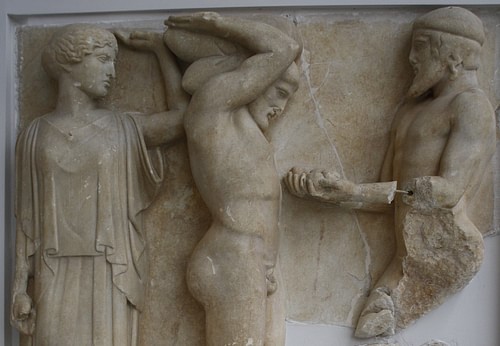
In Greek mythology, the Titan Atlas was responsible for bearing the weight of the heavens on his shoulders, a burden given to him as punishment by Zeus. Father of many stars and a protagonist in one of Hercules' famous labours, Atlas was also known as a wise man and the founder of astronomy. For Plato, he was the eponymous first king of Atlantis, and this giant of a god also gave his name to a huge mountain range in northern Africa, the great Atlantic Ocean and any large collection of maps.
With a name perhaps conveying the meaning 'suffering' or 'very enduring,' Atlas was the son of the Titans Iapetus and Clymene (or Themis) and the elder brother of Epimetheus, Menoetius, and Prometheus. Atlas was the father of the nymph Calypso and the seven Pleiades. In a Theban version of events, Atlas is also the grandfather of Niobe.
Atlas' Punishment from Zeus
Atlas was given the task of holding up the heavens as punishment from Zeus for leading the Titans in their battle with the Olympian Gods for control of the heavens. In a similar vein, Homer describes Atlas in his Odyssey as 'deadly-minded,' as knowing the depths of all the seas, and as holding the pillars far out in the Atlantic Ocean which hold the heavens and earth apart. Hesiod in his Theogony also describes Atlas as holding up the heavens and locates him in the land of the Hesperides (female deities famed for their singing), which was far to the west, at the edge of the world. Later tradition, including Herodotus, associates the god with the Atlas Mountains in North Africa. It was here that, in punishment for his gross lack of hospitality, the Titan was transformed from a shepherd into a huge rock mountain by Perseus using the head of the Gorgon Medusa with her deadly stare. This story may go back to the 5th century BCE.
Atlas & Hercules
Other associations with Atlas are as the father of many constellations, as a source of great wisdom and founder of astronomy, and, by Plato in his Critias, as the original king of Atlantis. Perhaps the most famous myth involving Atlas, though, is his role in one of the celebrated twelve labours of Hercules. The hero was required by Eurystheus to fetch the golden apples from the fabled gardens of the Hesperides, which were sacred to Hera and guarded by the fearsome hundred-headed dragon Ladon. Following the advice of Prometheus, Hercules asked Atlas (in some versions the father of the Hesperides) to get him the apples while he, with the help of Athena, took the world onto his shoulders for a while, giving the Titan a welcome respite. Perhaps understandably, when returning with the golden apples, Atlas was reluctant to reassume the burden of carrying the world. However, the wily Hercules tricked the god into swapping places temporarily while the hero got himself some cushions to more easily bear the tremendous weight. Of course, as soon as Atlas was back holding the heavens, Hercules with his golden booty, hot-footed back to Mycenae.
Representations in Art
In Greek art, Atlas is, from the 6th century BCE, often featured in depictions of the labours of Hercules, most notably in a metope from the temple of Zeus at Olympia (c. 460 BCE) where he stands in the gardens of the Hesperides. Similar scenes were also popular on Greek pottery decoration, particularly with his brother Prometheus. In Hellenistic and Roman times, Atlas is frequently represented in his now familiar position with bent knees and back, straining to hold the globe on his shoulders. Perhaps the most outstanding example of this pose is the 2nd-century CE sculpture now in the Archaeological Museum of Naples.
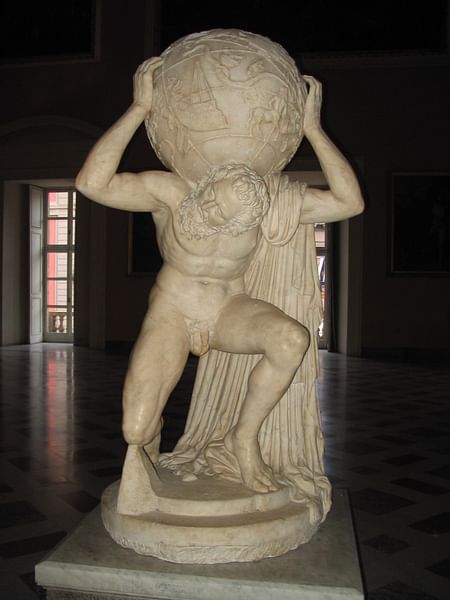

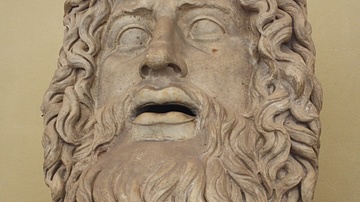
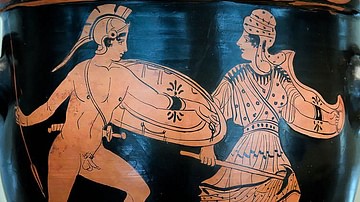

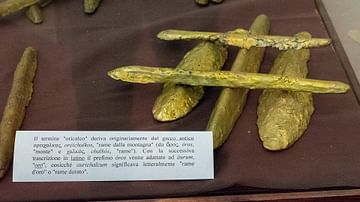
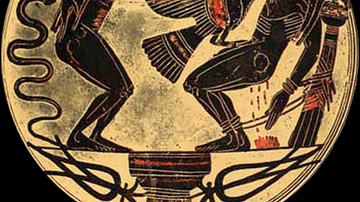



![National Geographic Road Atlas 2023: Scenic Drives Edition [United States, Canada, Mexico] (National Geographic Recreation Atlas)](https://m.media-amazon.com/images/I/51KElbYpAYL._SL160_.jpg)
